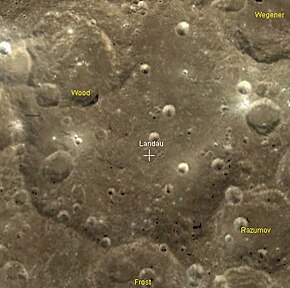Landau (crater)
 Landau from orbit. | |
| Coordinates | 41°36′N 118°06′W / 41.6°N 118.1°W |
|---|---|
| Diameter | 214 km |
| Depth | Unknown |
| Colongitude | 121° at sunrise |
| Eponym | Lev D. Landau |


Landau is a large lunar impact crater that is located in the northern hemisphere on the far side of the Moon. It was named after physicist Lev Landau. The crater Wegener is attached to the northeastern rim. Attached to the southeastern rim is Frost.
The outer rim of Landau is heavily eroded and modified by subsequent impacts. The most notable of these is Wood, which overlays the northwest rim. Much of the floor is hilly and irregular, with only the northeast quadrant being somewhat level. There are multiple small craters and craterlets in the floor. The most intact section of the rim is in the southwest, although this is now little more than a low ridge line.
Landau lies at the approximate margin of the Coulomb-Sarton Basin, a 530 km wide impact crater of Pre-Nectarian age.
Satellite craters
By convention these features are identified on lunar maps by placing the letter on the side of the crater midpoint that is closest to Landau.
| Landau | Latitude | Longitude | Diameter |
|---|---|---|---|
| Q | 41.0° N | 121.7° W | 32 km |
References
- Andersson, L. E.; Whitaker, E. A. (1982). NASA Catalogue of Lunar Nomenclature. NASA RP-1097.
{{cite book}}: Invalid|ref=harv(help) - Blue, Jennifer (July 25, 2007). "Gazetteer of Planetary Nomenclature". USGS. Retrieved 2007-08-05.
{{cite web}}: Invalid|ref=harv(help) - Bussey, B.; Spudis, P. (2004). The Clementine Atlas of the Moon. New York: Cambridge University Press. ISBN 978-0-521-81528-4.
{{cite book}}: Invalid|ref=harv(help) - Cocks, Elijah E.; Cocks, Josiah C. (1995). Who's Who on the Moon: A Biographical Dictionary of Lunar Nomenclature. Tudor Publishers. ISBN 978-0-936389-27-1.
{{cite book}}: Invalid|ref=harv(help) - McDowell, Jonathan (July 15, 2007). "Lunar Nomenclature". Jonathan's Space Report. Retrieved 2007-10-24.
{{cite web}}: Invalid|ref=harv(help) - Menzel, D. H.; Minnaert, M.; Levin, B.; Dollfus, A.; Bell, B. (1971). "Report on Lunar Nomenclature by the Working Group of Commission 17 of the IAU". Space Science Reviews. 12 (2): 136–186. Bibcode:1971SSRv...12..136M. doi:10.1007/BF00171763.
{{cite journal}}: Invalid|ref=harv(help) - Moore, Patrick (2001). On the Moon. Sterling Publishing Co. ISBN 978-0-304-35469-6.
{{cite book}}: Invalid|ref=harv(help) - Price, Fred W. (1988). The Moon Observer's Handbook. Cambridge University Press. ISBN 978-0-521-33500-3.
{{cite book}}: Invalid|ref=harv(help) - Rükl, Antonín (1990). Atlas of the Moon. Kalmbach Books. ISBN 978-0-913135-17-4.
{{cite book}}: Invalid|ref=harv(help) - Webb, Rev. T. W. (1962). Celestial Objects for Common Telescopes (6th revised ed.). Dover. ISBN 978-0-486-20917-3.
{{cite book}}: Invalid|ref=harv(help) - Whitaker, Ewen A. (1999). Mapping and Naming the Moon. Cambridge University Press. ISBN 978-0-521-62248-6.
{{cite book}}: Invalid|ref=harv(help) - Wlasuk, Peter T. (2000). Observing the Moon. Springer. ISBN 978-1-85233-193-1.
{{cite book}}: Invalid|ref=harv(help)
